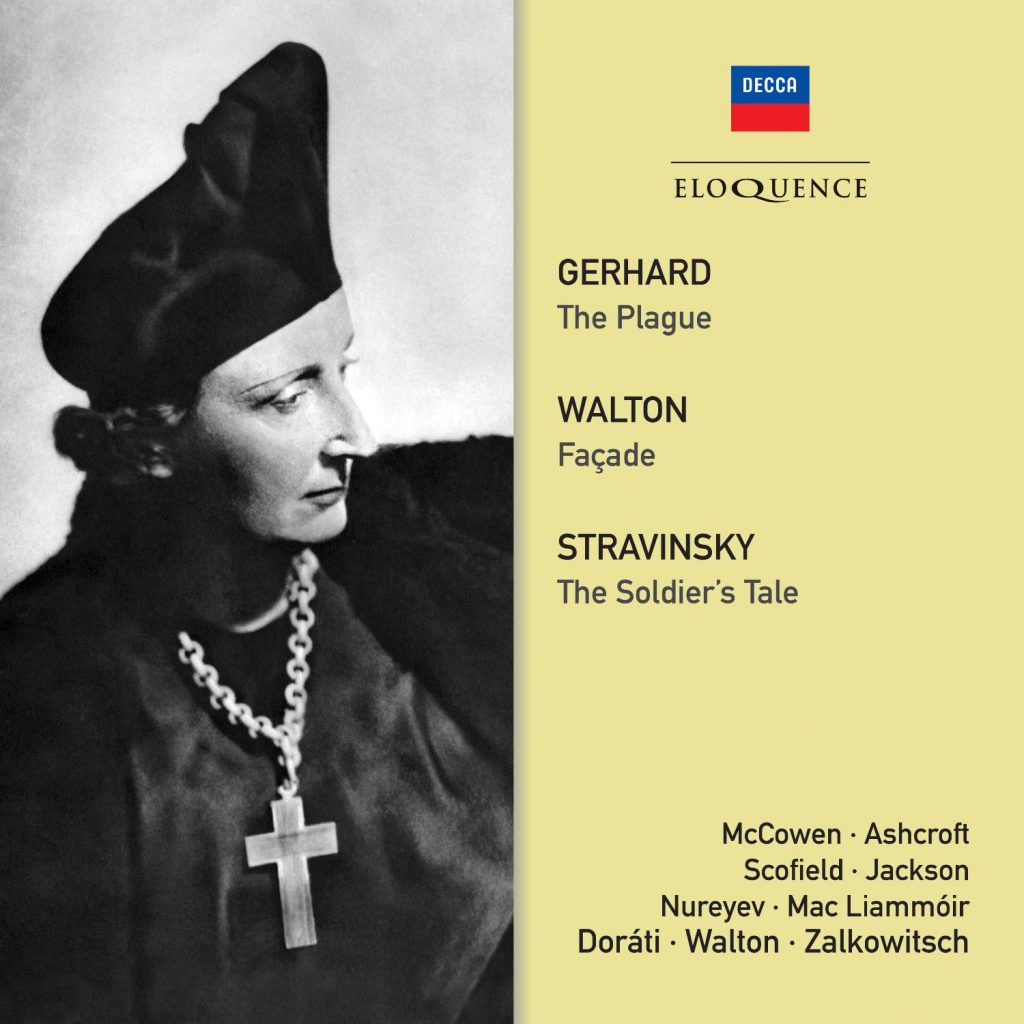
| A trio of twentieth-century classics, sardonic and timely tales, in long-unavailable Decca/Argo recordings from the 1970s.
Roberto Gerhard’s imagination was immediately fired by reading Albert Camus’ 1947 novel, La Peste, about a French-Algerian town in the sudden grip of bubonic plague. He determined to make a musical setting (The Plague), and after its premiere in 1964 few were left unmoved, or in any doubt about the work’s significance as a bitter, retrospective allegory on the evils of Nazism so recently extinguished. Now that Gerhard’s score has taken on a new and unwonted relevance, this reissue of its first recording on Argo should win new converts to his music. It is led with remarkable sympathy by Antal Doráti, the Hungarian-born conductor who had become a friend of the composer as well as a mainstay of the Decca and Mercury catalogues. It was through Gerhard that Doráti met William Glock, who engaged him as principal conductor of the BBC Symphony Orchestra. Also originally issued by Argo, the 1972 recording of Walton’s Façade enjoys a unique authority as the composer’s only stereo version of the score, featuring Peggy Ashcroft and Paul Scofield as narrators. Though Walton arranged and revised the score many times after its scandalous premiere in 1922, for the Argo recording he returned to his 1951 version scored for the original combination of six instruments. Ashcroft – in the tradition of Façade’s author and first narrator, Edith Sitwell – and Scofield declaim the absurdist texts with all their famed resources of nuance, timing and eloquence. To record The Soldier’s Tale in 1975, Decca acquired the services of Glenda Jackson, known worldwide at the time for her Oscar-winning performance in Women in Love (1969) and Ken Russell’s next film, The Music Lovers (1970), in which she played the unfortunate wife of Tchaikovsky. She was joined in Decca’s Hampstead studios by the Irish actor and founder of Dublin’s Gate Theatre, Micheál Mac Liammóir, and none other than Rudolf Nureyev, who gave a somewhat stilted, authentically arch performance as the Soldier of the tale. They were backed by a small ensemble of expert London-based musicians, headed by the former leader of the London Symphony Orchestra, Erich Gruenberg, in a rare, complete recording of Stravinsky’s original version of the score, with a new translation of the narrative.
|
ROBERTO GERHARD (1896–1970)
The Plague
Alec McCowen, narrator
National Symphony Orchestra & Chorus, Washington D.C.
Antal Doráti
SIR WILLIAM WALTON (1902–1983)
Façade
Dame Peggy Ashcroft, Paul Scofield, reciters
London Sinfonietta
Sir William Walton
IGOR STRAVINSKY (1882–1971)
The Soldier’s Tale
Glenda Jackson, narrator
Rudolf Nureyev, soldier
Micheál Mac Liammóir, The Devil
Instrumental Ensemble directed by Gennady Zalkowitsch
FIRST CD RELEASES ON DECCA
Recording Producers: James Mallinson (Gerhard); Michael Bremner (Walton); Christopher Raeburn (Stravinsky: music), Harley Usill (Stravinsky: narration)
Balance Engineers: Kenneth Wilkinson, Colin Moorfoot, Michael Mailes (Gerhard); Stanley Goodall (Walton); Iain Churches (Stravinsky: music), Kevin Daly (Stravinsky: narration)
Recording Locations: Constitution Hall, Washington D.C., USA, 11 May 1973 (Gerhard); Abbey Road Studio 1, London, UK, 5–7 May 1969 (Walton: music), Air Studios, London, UK, 9, 10, 16–18 & 21 February 1972 (Walton: recitation); Decca Studios, Tollington Park, London, UK, 5 September 1975 (Stravinsky: music), Argo Studios, London, UK, September 1975 (Stravinsky: narration)
Original Releases: Decca ‘Headline’: HEAD 6 (Gerhard): November 1974; Argo ZRG 649 (Walton): May 1972; Argo ZNF 15 (Stravinsky): June 1977
“Doráti’s sympathy and authority are everywhere to be noted. No one plays Gerhard’s larger scores better than he … It deserves to arouse a lot of interest.” Gramophone, December 1974
“One of a series of first-rate recordings of large-scale new music that Decca recorded with Doráti and his Washingtonians … absolutely compelling … Enthusiastically recommended.” Fanfare, November 2006 (Gerhard)
“The Argo ensemble plays with greater bite [than the Boston recording on DG] and no less precision … Erich Gruenberg a seductively saturnine fiddler.” Gramophone, July 1977 (Stravinsky)
“Micheál Mac Liammóir as a marvellous crawling toad of a Devil and Nureyev in there somewhere, high accented, beset by his colleagues and seeming quite the ingenu.” The Times, July 1977 (Stravinsky)
“Peggy Ashcroft is aptly characterful … The composer keeps the music going as a subtle, quiet commentary in the background, and the effect is unique. The stereo is both atmospheric and immediate, and you can hear every word.” Penguin Guide (Walton)

